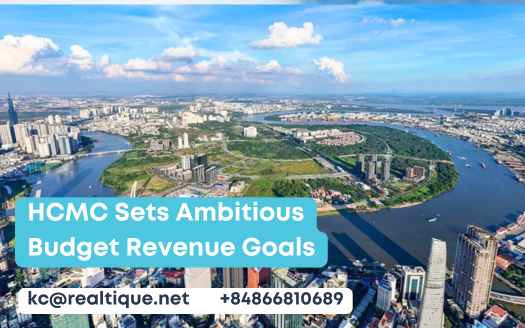HCMC Sets Ambitious Budget Revenue Goals
Ho Chi Minh City (HCMC) has established ambitious budget revenue goals, aiming for a minimum retention rate of 21% by 2025, with aspirations to enhance this figure to between 23% and 25% by 2026. This initiative highlights the city’s strategic focus on improving living standards and driving economic growth, critical as it positions itself as Vietnam’s economic powerhouse. However, the path to achieving these targets is fraught with challenges, particularly in addressing infrastructure deficiencies and ensuring revenue stability. The implications of these goals warrant careful examination, particularly regarding future economic sustainability and investment prospects.
Table of Contents
Overview of Budget Revenue Goals
Recognizing the critical importance of sustainable financial growth, HCMC has established ambitious budget revenue goals aimed at enhancing the city’s development initiatives.
The city aims to maintain a minimum budget revenue of 21% from 2025 onwards, promoting a strong financial structure to support strategic projects. This revenue increase is essential to improving living standards for residents and aligning with national economic growth targets.
In addition, HCMC’s budget revenue goals comply with Regulation 31 of the Central Government, which sets the basis for developmental consistency.
These objectives not only reflect the city’s commitment to responsible fiscal management but also highlight its crucial role in driving economic advancement within the broader national setting.
Sustainable revenue growth remains critical for HCMC’s continued progress.
Current Budget Regulations and Retention
In accordance with Regulation 31, HCMC’s current budget retention rate is set at 21%, a benchmark that the city aims to maintain through 2025 and beyond.
This retention rate, while essential for local governance, is notably the lowest among major Vietnamese cities and is impacted by the central government’s budget distribution policies.
Additionally, Regulation 70 outlines that only 18 out of 63 provinces have similar budget retention provisions, highlighting the unique financial environment HCMC maneuvers.
The city’s commitment to sustaining this rate is critical for funding important services and development projects, thereby directly influencing the quality of life for its residents.
Strategic adherence to these regulations will be significant for future economic stability and growth.
Economic Contributions of HCMC
HCMC plays a vital part in Vietnam’s economy, contributing approximately 23% to the national GDP.
This lively city is recognized as the largest service and industrial hub in the country, driving significant economic activity and innovation.
Labor productivity in HCMC exceeds the national average by over 2.8 times, underscoring its role as a powerhouse for economic growth.
The city has also made substantial investments in advanced technology and smart city initiatives, which further enhance its economic contributions.
These efforts not only strengthen local employment but also attract foreign investment, solidifying HCMC’s position as a key engine of national economic progress.
Challenges Facing Budget Revenue
Budget revenue generation in Ho Chi Minh City faces increasing challenges that threaten its financial stability.
Key issues include significant infrastructure development needs, which strain financial resources and create inefficiencies. Additionally, traffic congestion remains a pressing concern, impacting productivity and economic performance.
Economic fluctuations further complicate revenue stability, as downturns can lead to reduced tax contributions from businesses and individuals. Furthermore, the city’s current budget retention rate is the lowest among major urban centers, limiting available funds for local initiatives.
Coupled with the central government’s budget distribution policies, these factors necessitate strategic planning to guarantee sustainable revenue growth and maintain HCMC’s competitive economic position within the national structure.
Continuous efforts are essential to address these challenges effectively.
Future Planning and Projections
Planning for the future of budget revenue in Ho Chi Minh City involves a strategic approach that emphasizes sustainable growth and resource optimization.
Projections for the years 2023-2026 indicate ambitions to increase budget retention rates from the current 21% to a range of 23-25%. Historical data supports this pathway, showcasing consistent growth in revenue contributions and significant surpluses relative to budget forecasts.
Future strategies will prioritize economic stability, addressing urban infrastructure challenges, and enhancing living standards. By focusing on advanced technology and smart city initiatives, HCMC aims to strengthen its economic position as a leading contributor to national GDP.
These measures will guarantee a resilient financial foundation for ongoing strategic development objectives.





